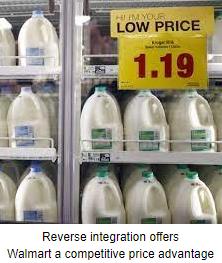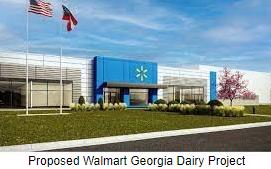 During the past week, Kroger Company announced expansion of its Kenlake Foods Subsidiary and concurrently Walmart committed to a dairy facility in Valdosta, GA. These investments suggest a move to consolidating supply chains and eliminating intermediates to enhance margins and ensure availability.
During the past week, Kroger Company announced expansion of its Kenlake Foods Subsidiary and concurrently Walmart committed to a dairy facility in Valdosta, GA. These investments suggest a move to consolidating supply chains and eliminating intermediates to enhance margins and ensure availability.
Kenlake Foods is one of 41 Kroger manufacturing plants providing 800 items including dry mixes, nuts, drink mixes and cereals. Kroger will invest $24 million to extend the Calloway County, KY. plant to 215,000 square feet.
 The Walmart dairy project will require an investment of $350 million in a new facility in Valdosta, GA. to supply 750 Walmart and Sam’s Club stores in the southeast. A range of milk products will be distributed under the Great Value® and Member’s Mark® brands.
The Walmart dairy project will require an investment of $350 million in a new facility in Valdosta, GA. to supply 750 Walmart and Sam’s Club stores in the southeast. A range of milk products will be distributed under the Great Value® and Member’s Mark® brands.
The Walmart dairy initiative follows a June 2020 investment in a case-ready beef plant in Thomasville, GA. to distribute steaks and roasts to Walmart stores in the southeast. In the same month, Walmart indicated that it would establish a case-ready beef plant in Olathe, KS. requiring an investment of $250 million. During August 2022 Walmart purchased a minority stake in Sustainable Beef LLC. located in North Platte, NE. in collaboration with rancher shareholders. Walmart has also invested in vertical farming through a $400 million allocation to Plenty Inc. The success of the Costco, Lincoln Premium Poultry complex in Freemont, NE. is now recognized with the operation producing two million rotisserie birds each week.
With the major chains investing in snacks, milk, beef, meat and chicken it is inevitable that one of the major retailers will turn their attention to eggs. Although there are risks associated with fluctuation in ingredient prices and HPAI, a regional and segment-related program could attract investment and integration with synergy in transport and elimination of marketing costs. Walmart as the largest retail grocer or alternatively the proposed combination of Kroger and Albertson’s could justify an investment.
The initial stage of integration would probably be acquisition of equity in an existing company. Since there are logistic and consumer perception benefits associated with regional production and distribution, a national retailer would consider a large producer such as Cal-Maine Foods, Opal Foods or Rose Acre Farms with broad geographic distribution and both cage-free and  conventional complexes. Regional chains such as Publix could consider an equity or ownership position in an efficient suitably sized producer with modern facilities central to their operations.
conventional complexes. Regional chains such as Publix could consider an equity or ownership position in an efficient suitably sized producer with modern facilities central to their operations.
Based on trends in reverse integration demonstrated by national supermarket chains some involvement in the egg industry is highly likely in the near future.